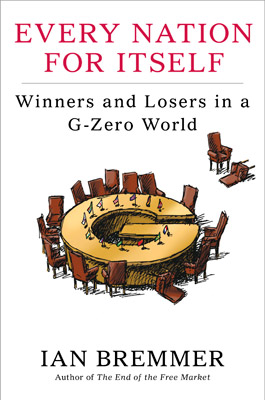Interview: Ian Bremmer and the New 'Regional World Order'

Ian Bremmer, President of Eurasia Group, at the Annual Meeting 2011 of the World Economic Forum in Davos, Switzerland, January 30, 2011. (World Economic Forum/Flickr)
For the first time in seven decades, there is no single power or alliance of powers ready to take on the challenges of global leadership. Asia Blog spoke to geopolitical analyst Ian Bremmer, whose latest book — Every Nation for Itself: Winners and Losers in a G-Zero World — illustrates a historic shift in the international system and the world economy and an unprecedented moment of global uncertainty. You can read an excerpt from the book here.
Dr. Bremmer will appear at Asia Society in New York at 12:30 p.m. on May 24 for a lunchtime discussion with Orville Schell, Asia Society’s Arthur Ross Director of the Center on U.S.-China Relations, to discuss the risks and opportunities in a world without global leadership. More information on the program may be found here. For those unable to attend the event, a free live webcast will be available at AsiaSociety.org/Live.
We spoke to Bremmer via email.
 Is the notion of a world without global leadership truly plausible to you, or does it represent only an important theoretical experiment that primes us for less than desirable economic outcomes?
Is the notion of a world without global leadership truly plausible to you, or does it represent only an important theoretical experiment that primes us for less than desirable economic outcomes?
There are no absolutes in this world, just as there is no true "free market" — even the United States, the beacon of liberal capitalism, actively interferes in its economy. Similarly, we don’t have a complete vacuum of global leadership. But it comes awfully close. The reality of change is dramatic, from the various post-WWII world orders to what we have now. Whether it was the G6, G7, or G8, they all amounted to a G1+ order: one in which the United States spearheaded global leadership with its allies on board with the program. Today, look at the way we aren't reacting to issues as broad as the European debt crisis and the civil war in Syria — and there is nobody else picking up the slack either. The difference is stark and apparent.
In actuality, how far are we from the “G-Zero world”? Would a “G-Zero” status be short-lived? Would there be a gradual transition to new powers?
I'd say we're here now. Again, look around. There are pressing international issues, but all of the world’s major powers, established and emerging, have domestic priorities that take precedence. The G-Zero started in 2008 with the financial crisis, even if it took a few years for the dust to settle in order for us to diagnose it for what it is. But the G-Zero is transitory — it's not going to persist long. I would roughly estimate that it goes on for another 5-20 years. It’s a transition period, but what is so unnerving to some is that it's not clear what we’re transitioning towards.
Even though we don’t know, there is a methodology that I think gives us the most likely scenarios. We need to ask, "How conciliatory or conflicting will the relationship between China and the U.S. be?" And then we need to decide how important or irrelevant other powers besides these two will be on a global stage. When we take these two answers in tandem, we get the most likely possibilities. The most probable outcome would have the U.S.-China relationship sour more, and other countries proving relatively important in comparison. This gives us a world of regions, where we find leadership at a sub-global level, but we still see failure to consistently set an international agenda. In this environment, global institutions become even more obsolete. Values and priorities get more local. It seems like inertia is taking us in this direction. More harmonious options would include a workable G2 of U.S.-China leadership, or a G20 that actually works. But both are less likely than regions, unfortunately.
How prominent do you think the role of the recent and de facto economic organization between Brazil, Russia, India, China, and South Africa (dubbed BRICS) will be in the future?
I don’t think it will be very prominent at all. So far, these countries cohere only to obstruct the agendas of others. They haven’t shown much capacity to lead themselves. The BRICS have mostly blocking power; they’re not proactive. They'll likely become noisier, and posture more like a bloc, but they won’t act like one — when China becomes the largest economy in the world, it is hard to think about it and other big "emerging markets" as a bloc. That’s especially true because of huge differences in values and systems between these countries. Put it this way. Russia and Brazil are energy exporters; India and China are heavy importers. India and Brazil are democracies; Russia and China sure aren’t. It will be hard for the BRICS organization to function as a NATO or G7 counterweight — it’s just too diverse and unstable.
In the absence of world powers shaping economies, will regional organizations like ASEAN fill the vacuum?
Yes, organizations like ASEAN will pick up a bit of the slack. But those regional organizations will have to adjust to very different local environments. In the G-Zero — and even more so should we see a world of regions — regions align with differing degrees of autonomy, and along distinct themes. Europe, for example, is the most formally organized region, with deep-rooted institutions, and it is organized based on shared political and economic ties. Eurasia is very different. It’s less voluntary, as Russia forces coordination from many of its neighbors, and it’s organized more along security and energy lines. The Middle East will be very divisive and organized with sectarian concerns in mind. With every region shaping up so differently, organizations like ASEAN will have to adapt to their particular landscape as well as the global environment.
In your book, you discuss possible military conflict with an increasingly powerful China and China’s attempts to wrest power from other Asian countries. What measures might Asian countries take to prevent such an outcome? How should the U.S. frame its policy to prepare for such an outcome? Is large-scale or regional war plausible to you as a consequence of these changes?
China’s neighbors will continue employing the strategy we’ve seen of late: They will try to pivot to maintain strong relations with both China and the U.S., where relations with China are predominantly economic and those with America are more security-based. This tack is plausible for some of these countries, but not all. Where not plausible, if China or the United States pushed back significantly, it would be prudent for these leaders to understand that and stand down. Misunderstandings on nations’ capacity to pivot matter a great deal. U.S. policy thus far is pretty much spot on. It’s framed correctly, but it’s critical that more U.S. engagement with Asian allies has a strong economic component and isn’t just security based. Stronger Trans-Pacific Partnership (TPP) engagement would be a very good idea; otherwise, the U.S. won't stick with it over time, and it won't be credible. Fighting in Asia is certainly plausible, though likely to be bilateral rather than a broader regional war (that’s because it’s most likely to come from the kinds of misunderstandings mentioned above).
What do you suspect is the most likely eventuality? Who will become the next global leader(s)?
The most likely eventuality, as I intimated above, would be a world of regions. The United States, despite its limited capacity to lead on a global level relative to 10 years ago, is still by far the most important power. But we won’t see "global leaders" in a regions environment. We’ll see regional governance and occasional broader consensus if a global challenge threatens a lot of different countries to an equal extent for an equal duration. Any way you slice it, a regional world order will be radically different than the one we've experienced over past decades — and much more problematic.
By Lyon Forage

